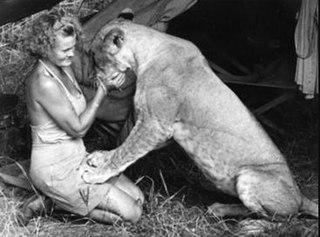A Quote by Jhumpa Lahiri
And yet he had loved her. A Bookish girl heedless of her beauty, unconscious of her effect. She'd been prepared to live her life alone but from the moment he'd known her he'd needed her.
Related Quotes
She was like me in lineaments-- her eyes Her hair, her features, all, to the very tone Even of her voice, they said were like to mine; But soften'd all, and temper'd into beauty; She had the same lone thoughts and wanderings, The quest of hidden knowledge, and a mind To comprehend the universe: nor these Alone, but with them gentler powers than mine, Pity, and smiles, and tears-- which I had not; And tenderness-- but that I had for her; Humility-- and that I never had. Her faults were mine-- her virtues were her own-- I loved her, and destroy'd her!
She had sacrificed her childhood to save her brothers; she loved her family above all else, and her spirits yearned to return home once more, to the wild forest and the land of mystic tales and ancient spirits whence he had taken her. That was the place of her heart, and if he loved her, he must let her go.
Selfishly, perhaps, Catti-brie had determined that the assassin was her own business. He had unnerved her, had stripped away years of training and discipline and reduced her to the quivering semblance of a frightened child. But she was a young woman now, no more a girl. She had to personally respond to that emotional humiliation, or the scars from it would haunt her to her grave, forever paralyzing her along her path to discover her true potential in life.
The adolescent does not develop her identity and individuality by moving outside her family. She is not triggered by some magic unconscious dynamic whereby she rejects her family in favour of her peers or of a larger society.... She continues to develop in relation to her parents. Her mother continues to have more influence over her than either her father or her friends.
He lifted his gaze to the framed photograph of Tanya and him taken on their wedding day. God, she had been lovely. Her smile had come through her eyes straight from her heart. He had known unequivocally that she loved him. He believed to this day that she had died knowing that he loved her. How could she not know? He had dedicated his life to never letting her doubt it.
Without beauty a girl is unhappy because she has missed her chance to be loved. People do not jeer at her, they are not cruel to her, but it is as if she were invisible, no eyes follow her as she walks. People feel uncomfortable when they are with her. They find it easier to ignore her. A girl who is exceptionally beautiful, on the other hand, who has something which too far surpasses the customary seductive freshness of adolescence, appears somehow unreal. Great beauty seems invariably to portend some tragic fate.
Little Lotte thought of everything and nothing. Her hair was as golden as the sun's rays, and her soul as clear and blue as her eyes. She wheedled her mother, was kind to her doll, took great care of her frock and her red shoes and her fiddle, but loved most of all, when she went to sleep, to hear the Angel of Music.
Her [Eleanor Roosevelt] father was the love of her life. Her father always made her feel wanted, made her feel loved, where her mother made her feel, you know, unloved, judged harshly, never up to par. And she was her father's favorite, and her mother's unfavorite. So her father was the man that she went to for comfort in her imaginings.
There is simply no dignified way for a woman to live alone. Oh, she can get along financially perhaps (though not nearly as well as a man), but emotionally she is never left in peace. Her friends, her family, her fellow workers never let her forget that her husbandlessness, her childlessness - her selfishness, in short - is a reproach to the American way of life.



































